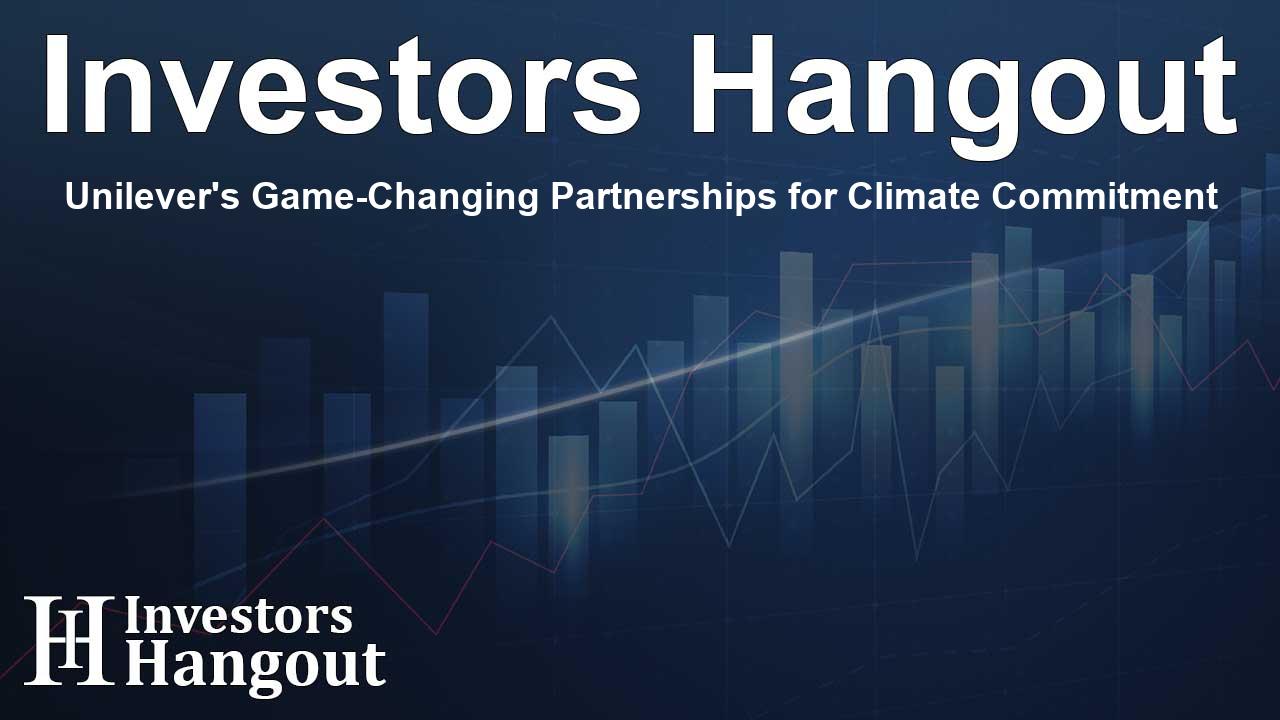Unilever's Game-Changing Partnerships for Climate Commitment

Unilever's Progressive Steps Towards Sustainability
Unilever, renowned for its diverse range of products including Dove soap, Knorr stock cubes, and Ben & Jerry's ice cream, is taking significant strides in sustainability. Recently, the company has forged sustainability agreements with its top retail partners, including Walmart, aimed at significantly reducing greenhouse gas emissions and minimizing waste throughout its supply chain. This initiative comes as a response to the growing awareness and urgency surrounding climate change.
The Impact of Sustainability Agreements
These collaborations are pivotal, particularly in the context of the 2015 Paris Agreement on climate change, which has driven many companies to implement more aggressive sustainability targets. CEO Hein Schumacher highlighted that the sustainable paths Unilever is taking are not just about fulfilling corporate social responsibility; they're essential for the company's long-term success.
Collaborative Efforts for Emission Reduction
Through its agreement with Walmart, Unilever is focusing on Scope 3 emissions, which encompass the indirect emissions that occur in a company’s supply chain. By collaborating with Walmart and other major retailers, Unilever aims to tackle these emissions, which are often the most challenging to quantify and mitigate. Walmart has previously announced its goal to work with suppliers to prevent a 'gigaton' of greenhouse gas emissions from entering the global value chain by 2030. Since the launch of this initiative in 2017, impressive reductions amounting to 574 million metric tons have already been reported, showcasing the effectiveness of this approach.
Adapting to Future Climate Challenges
Beyond just partnerships, Unilever's innovative use of climate modeling is allowing it to adapt its supply chain to better handle unforeseen events linked to climate change, such as droughts. Schumacher mentioned how the company has altered its mustard seed and tomato supply chains to enhance their resilience. This forward-thinking approach ensures that production can continue even amidst adverse weather conditions.
Creating Sustainable Products
Another exciting aspect of Unilever's strategy involves its partnership with A.S. Watson to develop environmentally friendly products, including body washes and toothpaste. This focus on sustainability not only helps in reducing the carbon footprint but also attracts a growing number of eco-conscious consumers who prioritize sustainable options in their purchasing decisions.
Challenges and Opportunities Ahead
While Unilever's commitment to sustainability has garnered praise from various investors and stakeholders, it has also faced scrutiny regarding the potential impact on profit growth. The transition towards sustainable practices often involves upfront investments and re-evaluation of product lines, leading to concerns over short-term profitability. However, experts suggest that by incorporating sustainability into their core strategies, companies can create long-term value and gain competitive advantages in the market.
Conclusion
In conclusion, Unilever is positioning itself as a frontrunner in the sustainability movement within the consumer goods sector. By forming partnerships with retail giants like Walmart and investing in innovative solutions to lower emissions and create sustainable products, the company is not only addressing the immediate challenges posed by climate change but is also paving the way for a more sustainable future. Stakeholders and consumers alike will be watching closely as Unilever continues to navigate this complex landscape and strive for a balance between environmental responsibility and business growth.
Frequently Asked Questions
What is Unilever's focus in its sustainability agreements?
Unilever's sustainability agreements focus on reducing greenhouse gas emissions and minimizing waste in its supply chain, particularly through partnerships with major retailers.
How does Unilever plan to adapt its supply chain to climate change?
Unilever is employing climate modeling techniques to enhance the resilience of its supply chain, making it more adaptable to adverse conditions like drought.
What type of products is Unilever developing sustainably?
Unilever is collaborating with A.S. Watson to create sustainable products, including body wash and toothpaste, to meet the growing demand for eco-friendly options.
How has Walmart influenced Unilever's sustainability efforts?
Walmart's goal to eliminate a gigaton of emissions by 2030 has prompted Unilever to align its sustainability initiatives and actively participate in emission reduction efforts within the supply chain.
What are Scope 3 emissions?
Scope 3 emissions refer to indirect greenhouse gas emissions that occur in a company's supply chain, which are particularly challenging to measure and manage compared to direct emissions.
About The Author
Contact Ryan Hughes privately here. Or send an email with ATTN: Ryan Hughes as the subject to contact@investorshangout.com.
About Investors Hangout
Investors Hangout is a leading online stock forum for financial discussion and learning, offering a wide range of free tools and resources. It draws in traders of all levels, who exchange market knowledge, investigate trading tactics, and keep an eye on industry developments in real time. Featuring financial articles, stock message boards, quotes, charts, company profiles, and live news updates. Through cooperative learning and a wealth of informational resources, it helps users from novices creating their first portfolios to experts honing their techniques. Join Investors Hangout today: https://investorshangout.com/
The content of this article is based on factual, publicly available information and does not represent legal, financial, or investment advice. Investors Hangout does not offer financial advice, and the author is not a licensed financial advisor. Consult a qualified advisor before making any financial or investment decisions based on this article. This article should not be considered advice to purchase, sell, or hold any securities or other investments. If any of the material provided here is inaccurate, please contact us for corrections.
